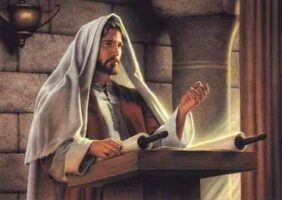Pekudei from a Messianic Perspective

Exodus 38:21-40:38
Pekudei is the final portion in the Book of Exodus, wrapping up the elaborate narrative of constructing the Tabernacle. At this juncture, the detailed account of the materials used and the completion of the assembly comes to life with vibrant descriptions.
This portion tends to focus a lot on the specifics. The Israelites meticulously take stock of gold, silver, and other resources dedicated to the sacred tabernacle. The inventory lists reveal much about their commitment and the resources they dedicated to divine service. It’s like flipping through the pages of an ancient ledger that not only marked wealth but faith.
Upon completing the Tabernacle, an atmosphere of completion and divine satisfaction envelops the community. The Israelites finally see their efforts culminate in a physical manifestation of sanctity. Their journey through hardship to fulfill God’s commandment finds a satisfying conclusion here, symbolizing more than just a building but a covenant come alive.
Pekudei gives us insights into the community spirit and their collective achievement. This portion not only sums up the physical creation but ties together all the themes of obedience, sacrifice, and celebration. This narrative holds a mirror to their dedication, like seeing faith inscribed in stones and gold.
The concluding scenes propagate themes bigger than the portion itself. They encapsulate their essence and evoke a reflection on the power of faith-driven unity and perseverance. The end of Exodus bounces off these themes, leaving a lasting imprint on the Torah’s canvas.
Messianic Insights: Finding Messiah Yeshua in Pekudei
Finding connections between the Tabernacle and the Messiah, Yeshua, adds a profound layer to studying Pekudei. The Tabernacle, a dwelling for the divine presence, mirrors the concept of God residing among humanity, ultimately personified in Yeshua’s journey.
The Word became a human being and lived with us, and we saw his Sh’khinah, the Sh’khinah of the Father’s only Son, full of grace and truth.
(John 1:14 CJB)
The Tabernacle’s intricate structure holds prophetic parallels to Yeshua’s life and mission. For instance, the sacrifice symbols point towards the ultimate atonement, echoing Yeshua’s role in salvation. These interpretations often arise from careful analysis by Messianic scholars who bridge Judaism’s rich traditions with the teachings of the New Testament.
Messianic thought often delves into the vivid imagery present in Pekudei, finding symbols and foreshadowing in the Tabernacle’s design. The olive oil used in the lamps, representing the light, resonates with how Yeshua is seen as a light in the world.
Yeshua spoke to them again: “I am the light of the world; whoever follows me will never walk in darkness but will have the light which gives life.”
(John 8:12 CJB)
Examining these insights offers a deeper appreciation of how early believers might have understood Yeshua’s fulfillment of ancient prophecies. By linking Pekudei’s elements with New Testament narratives, we unravel a tapestry where prophetic visions and fulfillment threads interweave.
Scholars support these insights using a blend of scriptural references from both Testaments, illustrating a continuity in the divine narrative. This enriches understanding and highlights the cohesiveness of the broader biblical journey.
Living the Message: Life Applications for Followers of Yeshua
Pekudei offers more than historical significance; it speaks to how we can live out our faith today as followers of Yeshua. By examining the dedication and precision the Israelites showed in constructing the Tabernacle, we find a call to apply such commitment in our daily lives.
Reflecting on stewardship, the Israelites managed their resources diligently to create a space worthy of the divine. For us, this translates into managing our own resources—be it time, talent, or treasure—wisely and purposefully.
There’s a compelling message in building our ‘spiritual tabernacle’, essentially preparing a life that welcomes and honors God’s presence. This requires cultivating spiritual disciplines and nurturing the relationships that bring us closer to our faith’s core values.
Community spirit that emerged in the making of the Tabernacle offers valuable lessons in unity and shared purpose. Like the Israelites, engaging in collective efforts within our communities can forge bonds and accomplish goals that reflect shared beliefs.
The themes of dedication and service resonate through time, urging modern believers to embody these principles actively. By committing to a life reflective of these values, we echo the legacy of faith and perseverance that characterizes Pekudei.
Dale Solberg is a guest writer at Messianic Torah Portion offering a commentary and devotional thoughts from a Messianic Perspective on each week’s Torah reading. His views and opinions do not necessarily reflect those of The Messianic Light. You can reach Dale at dale@messianictorahportion.com.
Unless otherwise noted, Scripture quotations are taken from the Complete Jewish Bible, Copyright © 1998 and 2016 by David H. Stern. Used by permission. All copyrights reserved worldwide.
This post contains affiliate links. Purchases help support Messianic Torah Portion and do not affect the price you pay. Please do not make purchases on the Sabbath.
Messianic Torah Portion is a ministry of The Messianic Light.

Comments
Pekudei from a Messianic Perspective — No Comments
HTML tags allowed in your comment: <a href="" title=""> <abbr title=""> <acronym title=""> <b> <blockquote cite=""> <cite> <code> <del datetime=""> <em> <i> <q cite=""> <s> <strike> <strong>